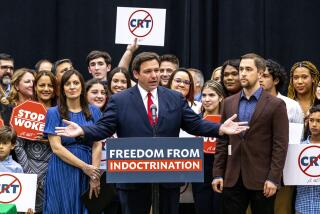If anyone asks, culture matters
What do 17-year-olds know? Not a whole lot, according to a study released last week by Common Core, a nonpartisan research group. Responding to what it sees as an overemphasis on reading and math at the expense of a liberal arts education, the group asked 1,200 students basic history, literature and civics questions. They scored a D, cumulatively, with 1 in 10 answering that Adolf Hitler was a munitions manufacturer between the two world wars (rather than chancellor of Germany during World War II) and one-quarter believing that Columbus set sail after 1750. Here’s a sample of the questions.
-- Swati Pandey
--
1. When was the Civil War? (43% answered correctly.)
a) Before 1750
b) 1750-1800
c) 1800-1850
d) 1850-1900
e) 1900-1950
f) After 1950
--
2. Which of the following is a novel by Ralph Ellison about a young man’s growing up in the South and then moving to Harlem? (41%)
a) “Sounder”
b) “Invisible Man”
c) “The Fire Next Time”
d) “Soul on Ice”
--
3. The purpose of the authors of the Federalist Papers was to (50%)
a) win foreign approval for the Revolutionary War
b) establish a strong, free press in the colonies
c) gain ratification of the United States Constitution
d) confirm George Washington’s election as the first president
--
4. Who is the character in an ancient Greek play who unknowingly killed his father and married his mother? (45%)
a) Agamemnon
b) Oedipus
c) Orestes
d) Prometheus
--
5. During World War II, the major enemies of the United States were (82%)
a) Vietnam and Korea
b) the Soviet Union and China
c) Germany and Japan
d) Cuba and Iran
--
6. Where do you find the guarantee of freedom of speech and religion? (67%)
a) “Common Sense”
b) the U.S. Constitution
c) the Bill of Rights
d) the Articles of Confederation
--
7. In its Brown vs. Board of Education decision of 1954, the Supreme Court (71%)
a) required the hiring of more minority teachers
b) declared racial segregation in public schools unconstitutional
c) forbade the practice of discrimination in hotels and motels
d) mandated busing of students to achieve racial balance in public schools
--
8. In the Bible, Job is known for his (50%)
a) skill as a builder
b) patience during suffering
c) prowess in battle
d) prophetic ability
--
9. The novel “To Kill a Mockingbird” by Harper Lee is about (79%)
a) a boy who had to learn how to hunt in order to be accepted by his older brothers
b) a young woman who had to learn to adapt to a simple life as she taught rural children in the early 1900s
c) two children who were affected by the conflict in their community when their father defended a black man
d) a young man who was returned to his family after he had grown up among the Indians
--
10. “We hold these truths to be self-evident, that all men are created equal, that they are endowed by their creator with certain unalienable rights, that among these are life, liberty and the pursuit of happiness.” These words are from: (73%)
a) “Common Sense”
b) the Declaration of Independence
c) President Lincoln’s second inaugural address
d) “Rights of Man”
--
11. Which American poet wrote the volume of poetry “Leaves of Grass,” which includes the line “I celebrate myself, and sing myself”? (72%)
a) Robert Lowell
b) Edna St. Vincent Millay
c) Archibald MacLeish
d) Walt Whitman
--
12. Who wrote “The Canterbury Tales,” a poem written in Middle English and containing stories told by people on a pilgrimage? (38%)
a) Andrew Marvell
b) Sir Thomas Malory
c) Edmund Spenser
d) Geoffrey Chaucer
--
Answers: 1-d, 2-b, 3-c, 4-b, 5-c, 6-c, 7-b, 8-b, 9-c, 10-b, 11-d, 12-d
More to Read
The biggest entertainment stories
Get our big stories about Hollywood, film, television, music, arts, culture and more right in your inbox as soon as they publish.
You may occasionally receive promotional content from the Los Angeles Times.










